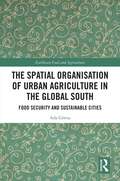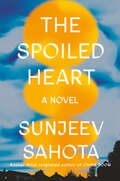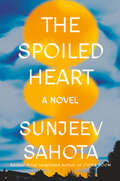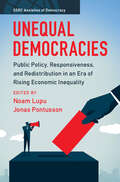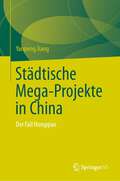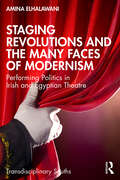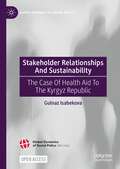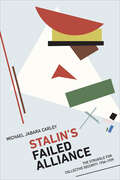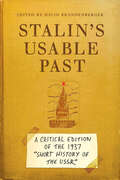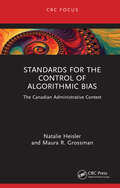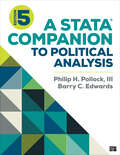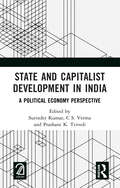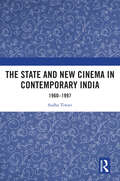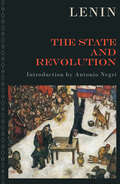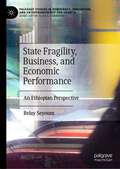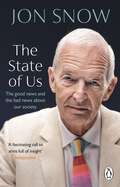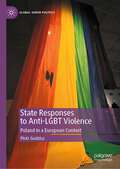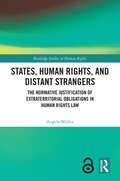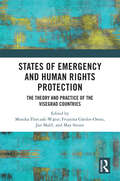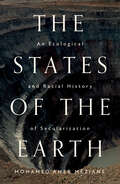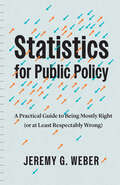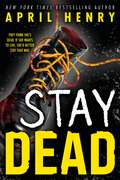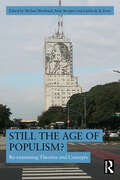- Table View
- List View
The Spatial Organisation of Urban Agriculture in the Global South: Food Security and Sustainable Cities (Earthscan Food and Agriculture)
by Ada GórnaThis book examines the role and position of urban agriculture in the spatial and functional structure of cities in the Global South.In the face of dynamic urbanisation and negative consequences of climate change, one of the key challenges is not only how to provide food for the ever-growing urban population but also how to achieve urban sustainability and simultaneously reduce the negative impact of cities on the natural environment. These problems are particularly urgent in the metropolises of the Global South that are experiencing the greatest population growth while struggling with increasing social inequalities and the resulting uneven distribution of resources. Examining the role that urban agriculture can play in addressing these challenges, this book draws on three case study cities: Havana, Singapore and Kigali. The case studies, differing in socio-economic, spatial, political and environmental terms, exemplify diverse characteristics of urban agriculture in different geographical conditions. Drawing on fieldwork conducted in each city, the book also provides a unique perspective on the constraints in the development of urban agriculture and the use of its full potential for urban sustainability.This book will appeal to students and scholars, as well as decision makers, interested in the issues of urban sustainability, food security, spatial development and alternative food systems.
Spice: The 16th-Century Contest that Shaped the Modern World
by Roger CrowleyThe story of the sixteenth-century&’s epic contest for the spice trade, which propelled European maritime exploration and conquest across Asia and the Pacific Spices drove the early modern world economy, and for Europeans they represented riches on an unprecedented scale. Cloves and nutmeg could reach Europe only via a complex web of trade routes, and for decades Spanish and Portuguese explorers competed to find their elusive source. But when the Portuguese finally reached the spice islands of the Moluccas in 1511, they set in motion a fierce competition for control. Roger Crowley shows how this struggle shaped the modern world. From 1511 to 1571, European powers linked up the oceans, established vast maritime empires, and gave birth to global trade, all in the attempt to control the supply of spices. Taking us on voyages from the dockyards of Seville to the vastness of the Pacific, the volcanic Spice Islands of Indonesia, the Arctic Circle, and the coasts of China, this is a narrative history rich in vivid eyewitness accounts of the adventures, shipwrecks, and sieges that formed the first colonial encounters—and remade the world economy for centuries to follow.
The Spoiled Heart: A Novel
by Sunjeev Sahota&“The Spoiled Heart confirms Sunjeev Sahota's position as one of our essential novelists.&” —Karan Mahajan, author of the National Book Award Finalist The Association of Small BombsA brilliant and riveting story of ambition, love, family secrets, and unintended consequences, from &“bold storyteller&” (The New Yorker) and two-time Booker Prize nominee Sunjeev SahotaNayan Olak keeps seeing Helen Fletcher around town. She&’s returned with her teenage son to live in the run-down house at the end of the lane, and—though she&’s strangely guarded—Nayan can&’t help but be drawn to her. He hasn&’t risked love since losing his young family in a terrible accident twenty years earlier.In the wake of the tragedy, Nayan&’s labor union, long a cornerstone of his community, became the center of his life: a way for him to channel his energies into making the world a better—fairer, as he sees it—place. Now, he&’s decided to mount a run for the leadership. But his campaign pits him against a newcomer, Megha, who quickly proves to be a more formidable challenger than he anticipated.As Nayan&’s differences with Megha spin out of control, complicating the ideals he&’s always held dear, he grows closer to Helen—and unknowingly barrels toward long-held secrets about how their pasts might be connected. Suddenly, much more is threatened than his chances of winning.In one sense a tragedy in the classic mold, tracing one man&’s seemingly inexorable fall, The Spoiled Heart is also an explosively contemporary story of how a few words or a single action—to one person careless, to another, charged—can trigger a cascade of unimaginable consequences. A vivid and multi-layered exploration of the mysteries of the heart, how community is forged and broken, and the shattering impact of secrets and assumptions alike, it is a blazing achievement from one of Britain&’s foremost living writers.
The Spoiled Heart: A novel
by Sunjeev Sahota&“The Spoiled Heart confirms Sunjeev Sahota's position as one of our essential novelists.&” —Karan Mahajan, author of the National Book Award Finalist The Association of Small Bombs A brilliant and riveting story of ambition, love, family secrets, and unintended consequences, from &“bold storyteller&” (The New Yorker) and two-time Booker Prize nominee Sunjeev SahotaNayan Olak keeps seeing Helen Fletcher around town. She&’s returned with her teenage son to live in the run-down house at the end of the lane, and—though she&’s strangely guarded—Nayan can&’t help but be drawn to her. He hasn&’t risked love since losing his young family in a terrible accident twenty years earlier.In the wake of the tragedy, Nayan&’s labor union, long a cornerstone of his community, became the center of his life: a way for him to channel his energies into making the world a better—fairer, as he sees it—place. Now, he&’s decided to mount a run for the leadership. But his campaign pits him against a newcomer, Megha, who quickly proves to be a more formidable challenger than he anticipated.As Nayan&’s differences with Megha spin out of control, complicating the ideals he&’s always held dear, he grows closer to Helen—and unknowingly barrels toward long-held secrets about how their pasts might be connected. Suddenly, much more is threatened than his chances of winning.In one sense a tragedy in the classic mold, tracing one man&’s seemingly inexorable fall, The Spoiled Heart is also an explosively contemporary story of how a few words or a single action—to one person careless, to another, charged—can trigger a cascade of unimaginable consequences. A vivid and multi-layered exploration of the mysteries of the heart, how community is forged and broken, and the shattering impact of secrets and assumptions alike, it is a blazing achievement from one of Britain&’s foremost living writers.
SSRC Anxieties of Democracy: Public Policy, Responsiveness, And Redistribution In An Era Of Rising Economic Inequality (Ssrc Anxieties Of Democracy Ser.)
by Noam Lupu Jonas PontussonStädtische Mega-Projekte in China: Der Fall Hongqiao
by Yanpeng JiangDieses Buch ist die erste systematische Darstellung von städtischen Megaprojekten in China, die sich mit deren Bau, Betrieb und Planung befasst. Es ist eine detaillierte Untersuchung der Planung und des Baus von Hongqiao und seiner Auswirkungen auf die Anwohner. Kurz gesagt, das Ziel dieses Buches ist es, den Planungs- und Entwicklungsprozess der Verkehrs- und Handelszone Hongqiao zu untersuchen, ihre Beziehung zur Stadtentwicklung und zur räumlichen Umstrukturierung in Shanghai zu erforschen und dabei die Art des städtischen Wandels im heutigen China zu kommentieren und zu kritisieren, der als eigentums- und infrastrukturgetrieben charakterisiert wird. Städtische Megaprojekte sind wohl das Symbol des unternehmerischen Urbanismus schlechthin, und es ist kein Zufall, dass sie in der ganzen Welt, nicht zuletzt in Ostasien, zu einem vertrauten Bestandteil der städtischen Szene geworden sind. Sie können sowohl als Folge der Deindustrialisierung führender Städte, zunächst in Nordamerikaund Europa und dann in Ostasien, als Reaktion auf den Übergang der Volkswirtschaften zum globalisierten Neoliberalismus betrachtet werden. Dieses Buch bietet einen umfassenden Überblick über die Hauptmerkmale der in Hongqiao gebildeten landbasierten städtischen Wachstumskoalition, indem es das Hongqiao-Projekt im Detail vorstellt und das jüngste Beispiel des wettbewerbsorientierten Ansturms auf städtische Projekte in Chinas größten Städten skizziert, der zur Ausbreitung neuer Finanzdistrikte in Beijing und Guangzhou geführt hat.
Staging Revolutions and the Many Faces of Modernism: Performing Politics in Irish and Egyptian Theatre (Transdisciplinary Souths)
by Amina ElHalawaniThe book explores how theatre, with its performative capacity, has the power to engage with and affect the politics of its day. It sets the stage for the reader to discover the revolutionary traditions of Egyptian and Irish theatre, very distinct in their histories and cultures, and understand their enduring relevance in today’s world. The volume takes Ireland as a case study of the interplay between cultural nationalism and politically engaged theatre and compares it to the role of the theatre in Egypt during its Golden era in the 1960s.Through a selection of Egyptian plays by Tawfiq al-Hakim, Mikhail Roman, Yusuf Idris, and Salah Abdul-Saboor, alongside Irish plays by Brian Friel, Frank McGuinness, Christina Reid, and Samuel Beckett, it maps the political aesthetics of unsteady times and seemingly disparate places to reflect on the dynamics of revolt as a staged act in and of itself. Further, the book examines how playwrights from both nations have engaged with theatre as a medium, focusing on how their contemplations, hesitations, frustrations, and protest have been translated onto the stage in their various plays, and comprehends the transformative role the theatre has always played in politics in shaping history across time and space.Bridging together discussions on transnational modernisms with nuanced cultural histories of protest, this critical work will be of great interest to scholars and researchers of literary studies, identity politics, cultural studies, theatre and performance studies, and political studies.
Stakeholder Relationships And Sustainability: The Case Of Health Aid To The Kyrgyz Republic (Global Dynamics of Social Policy)
by Gulnaz IsabekovaThis open-access book analyses how stakeholder relationships impact the sustainability of health aid. It does this by providing an overarching analytical framework, which allows for a systematic analysis of sustainability, relationships, and a possible causal link between these phenomena. The book goes beyond universal paradigms and detailed single-case studies by offering a thorough analysis of development projects to identify the factors that are also applicable to similar initiatives in comparable contexts.Empirically, it focuses on two health initiatives, both implemented in the Kyrgyz Republic, a country pursuing a sector-wide approach to health aid. Unique primary material provides insights into a geographic region that is mostly neglected, and will be of interest to students and researchers of social policy, development studies, international health and those focusing on the post-Soviet region and Central Asia.
Stalin’s Failed Alliance: The Struggle for Collective Security, 1936–1939
by Michael Jabara CarleyIn the spring of 1936, the Soviet effort to build an anti-Nazi alliance was failing. Stalin continued nevertheless to support diplomatic efforts to stop Nazi aggression in Europe. In Stalin’s Failed Alliance, the sequel to Stalin’s Gamble, Michael Jabara Carley continues his re-evaluation of European diplomacy during the critical events between May 1936 and August 1939. This narrative history examines the great crises of the pre-war period – the Spanish Civil War, Anschluss, and Munich accords – as well as both the last Soviet efforts to organize an anti-Nazi alliance in the spring–summer of 1939 and Moscow’s shocking volte-face, the signing of the Nazi-Soviet non-aggression pact. Carley’s history traces the lead-up to the outbreak of war in Europe on 1 September 1939 and sheds light on the Soviet Union’s efforts to organize a defensive alliance against Nazi Germany, in effect rebuilding the anti-German Entente of the First World War. The author argues for the sincerity of Soviet overtures to the western European powers and that the non-aggression pact was a last-ditch response to the refusal of other states, especially Britain and France, to conclude an alliance with the USSR against Nazi Germany. Drawing on extensive archival research in Soviet and Western archival papers, Stalin’s Failed Alliance aims to see the European crisis of the 1930s through Soviet eyes.
Stalin's Usable Past: A Critical Edition of the 1937 Short History of the USSR (Stanford–Hoover Series on Authoritarianism)
by David BrandenbergerAt the height of the Great Terror in 1937, Joseph Stalin took a break from the purges to edit a new textbook on the history of the USSR. Published shortly thereafter, the Short History of the USSR amounted to an ideological sea change. Stalin had literally rewritten Russo-Soviet History, breaking with two decades of Bolshevik propaganda that styled the 1917 Revolution as the start of a new era. In its place, he established a thousand-year pedigree for the Soviet state that stretched back through the Russian empire and Muscovy to the very dawn of Slavic civilization. Appearing in million-copy print runs through 1955, the Short History transformed how a generation of Soviet citizens were to understand the past, not only in public school and adult indoctrination courses, but on the printed page, the theatrical stage, and the silver screen. Stalin's Usable Past supplies a critical edition of the Short History that both analyzes the text and places it in historical context. By highlighting Stalin's precise redactions and embellishments, historian David Brandenberger reveals the scope of Stalin's personal involvement in the textbook's development, documenting in unprecedented detail his plans for the transformation of Soviet society's historical imagination.
Standards for the Control of Algorithmic Bias: The Canadian Administrative Context
by Natalie Heisler Maura R. GrossmanGovernments around the world use machine learning in automated decision-making systems for a broad range of functions. However, algorithmic bias in machine learning can result in automated decisions that produce disparate impact and may compromise Charter guarantees of substantive equality. This book seeks to answer the question: what standards should be applied to machine learning to mitigate disparate impact in government use of automated decision-making? The regulatory landscape for automated decision-making, in Canada and across the world, is far from settled. Legislative and policy models are emerging, and the role of standards is evolving to support regulatory objectives. While acknowledging the contributions of leading standards development organizations, the authors argue that the rationale for standards must come from the law and that implementing such standards would help to reduce future complaints by, and would proactively enable human rights protections for, those subject to automated decision-making. The book presents a proposed standards framework for automated decision-making and provides recommendations for its implementation in the context of the government of Canada’s Directive on Automated Decision-Making. As such, this book can assist public agencies around the world in developing and deploying automated decision-making systems equitably as well as being of interest to businesses that utilize automated decision-making processes.
A Stata® Companion to Political Analysis
by Philip H. Pollock Barry Clayton EdwardsThe Fifth Edition of A Stata® Companion to Political Analysis by Philip H. Pollock III and Barry C. Edwards teaches your students to conduct political research with Stata, one of the most popular statistical software packages. This workbook offers the same easy-to-use and effective style as the other companions to the Essentials of Political Analysis, to work with Stata versions 12 through 17. With this comprehensive workbook, students analyze research-quality data to learn descriptive statistics, data transformations, bivariate analysis (such as cross-tabulations and mean comparisons), controlled comparisons, correlation and bivariate regression, interaction effects, and logistic regression. The many annotated screen shots, as well as QR codes linking to demonstration videos, supplement the clear explanations and instructions. End-of-chapter exercises allow students to ample space to practice their skills. The Fifth Edition includes new and revised exercises, along with new and updated datasets from the 2020 American National Election Study, an experiment dataset, and two aggregate datasets, one on 50 U.S. states and one based on countries of the world. A new 15-chapter structure helps break up individual elements of political analysis for deeper explanation while updated screenshots reflect the latest platform.
A Stata® Companion to Political Analysis
by Philip H. Pollock Barry Clayton EdwardsThe Fifth Edition of A Stata® Companion to Political Analysis by Philip H. Pollock III and Barry C. Edwards teaches your students to conduct political research with Stata, one of the most popular statistical software packages. This workbook offers the same easy-to-use and effective style as the other companions to the Essentials of Political Analysis, to work with Stata versions 12 through 17. With this comprehensive workbook, students analyze research-quality data to learn descriptive statistics, data transformations, bivariate analysis (such as cross-tabulations and mean comparisons), controlled comparisons, correlation and bivariate regression, interaction effects, and logistic regression. The many annotated screen shots, as well as QR codes linking to demonstration videos, supplement the clear explanations and instructions. End-of-chapter exercises allow students to ample space to practice their skills. The Fifth Edition includes new and revised exercises, along with new and updated datasets from the 2020 American National Election Study, an experiment dataset, and two aggregate datasets, one on 50 U.S. states and one based on countries of the world. A new 15-chapter structure helps break up individual elements of political analysis for deeper explanation while updated screenshots reflect the latest platform.
State and Capitalist Development in India: A Political Economy Perspective
by Surinder Kumar C. S. Verma Prashant K. TrivediThis book seeks to encourage dialectical methods through the interaction of economic, political and social factors to approach social analysis. It examines various emerging issues in society in the era of globalization. The issues raised in the critique will benefit scholars in comprehending social reality with a new perspective and approach. This book will help policymakers look at more realistic conclusions for policy making. This title is co-published with Aakar Books. Print editions not for sale in South Asia (India, Sri Lanka, Nepal, Bangladesh, Pakistan and Bhutan)
The State and New Cinema in Contemporary India: 1960–1997
by Sudha TiwariThis book examines the relationship between the newly independent Indian state and its New Cinema movement. It looks at state formative practices articulating themselves as cultural policy. It presents an institutional history of the Film Finance Corporation (FFC), later the National Film Development Corporation (NFDC), and their patronage of the New Cinema in India, from the 1960s to the 1990s, bringing into focus an extraordinary but neglected cultural moment in Indian film history and in the history of contemporary India. The chapters not only document the artistic pursuit of cinema, but also the emergence of a larger field where the market, political inclinations of the Indian state, and the more complex determinants of culture intersect — how the New Cinema movement faced external challenges from the industrial lobby and politicians, as well as experienced deep rifts from within. It also shows how the Emergency, the Janata Party regime, economic liberalization, and the opening of airwaves all left their impact on the New Cinema. The volume will be of great interest to scholars and researchers of film studies, politics and public policy, especially cultural policy, media and culture studies, and South Asian studies.
The State and Revolution
by V. I. LeninLenin's most important and controversial theoretical textLenin&’s booklet The State and Revolution struck the world of Marxist theory like a lightning bolt. Written in the months running up to the October Revolution of 1917, Lenin turned the traditional socialist concept of the state on its head, arguing for the need to smash the organs of the bourgeois state to create a &‘semi-state&’ of soviets, or workers&’ councils, in which ordinary people would take on the functions of the state machine in a new and radically democratic manner.This new edition includes a substantial introduction by renowned theorist Antonio Negri, who argues for the continued relevance of these ideas.
State Fragility, Business, and Economic Performance: An Ethiopian Perspective (Palgrave Studies in Democracy, Innovation, and Entrepreneurship for Growth)
by Belay SeyoumThe growing number of states with weak capacity to carry out basic governance functions is leading to unacceptable levels of human suffering. Using Ethiopia as a case study, this book acknowledges the multidimensional nature of state fragility and highlights the non-political factors that drive it.The first part uses institutional theory to explore how weak institutions become a source of state fragility by undermining social cohesion and the broader economic progress of countries. Part two examines the role of entrepreneurship and industrial policy as a means of creating and sustaining economic and political stability, trade policy as a means of increasing incomes and easing tensions, and technology policy as a means of engaging people in entrepreneurship and innovation. The final chapter provides lessons that fragile nations can learn from successful developing countries in Southeast Asia and Latin America.This book will appeal to researchers interested in international business, economic and business policy, international trade, and emerging markets who seek to understand how fragile states can promote sustainable peace and development.
The State of Us: The good news and the bad news about our society
by Jon Snow'A fascinating call to arms full of insight' IndependentAfter four decades broadcasting to the nation each night, Jon Snow gives vent to his opinions on the state of our nation . . . the good news and the bad newsIt is rare in history that so many nations in the developed world are in crisis at the same time. There has been a disintegration of trust in political leaders and in the media that holds them to account. For all the progress humankind has made, for all the inventions and new technologies, our society is being undermined by inequality. To fix it, we must begin by seeking out the truth about our world.In The State of Us, Jon Snow traces how the life of the nation has changed across his five-decade career, from getting thrown out of university for protesting apartheid to interviewing every prime minister since Margaret Thatcher.In doing so, he shows how the greatest problems at home and abroad so often come down to inequality and an unwillingness to confront it. But that is not our fate. Despite the challenges, Snow has witnessed profound social progress. In this passionate rallying cry, he argues that at its best, journalism reflects not just who we are now, but who we can be.We've had enough of division; the future is for us.
State Responses to Anti-LGBT Violence: Poland in a European Context (Global Queer Politics)
by Piotr GodziszThis book offers a much-needed analysis of the difficulties associated with providing state protection from violence based on sexual orientation and gender identity in Europe. Focusing on Poland as a national case study, encompassed in the broader European context, the book provides a holistic analysis of internal and external factors influencing state-level policy outcomes. By focusing on hate crime advocacy and carefully dissecting it from the rest of the LGBT rights “package,” the book fills a gap in queer scholarship, which has overlooked this aspect of mobilisation. The book also examines the emerging international standards and provides a comparative analysis of national laws, policies and practices on anti-LGBT hate crime across Europe. Highlighting variance in outcomes in different areas of LGBT rights, this book considers the role of lesser-known actors and mechanisms who are key in enacting critical policy changes. State Responses to Anti-LGBT Violence provides a critical reflection on the complicated relationships between queer communities and the state.
States, Human Rights, and Distant Strangers: The Normative Justification of Extraterritorial Obligations in Human Rights Law (Routledge Studies in Human Rights)
by Angela MüllerThis book combines legal and philosophical perspectives to address the question of whether states are bound by human rights when they act with effects on people abroad—states’ extraterritorial human rights obligations. Taking an innovative approach, it begins with a profound legal analysis of the issue at national, supranational, and international levels and then engages in depth with counterarguments against extraterritorially applying human rights, on the basis of which it develops its own ethical justificatory theory of extraterritorial human rights obligations. The book closes the circle by showing what the practical implications of this theory for the interpretation (and possible evolvement) of human rights law would be. In a world where critiques of, and resistance to, the general idea of universal human rights are on rise, the book contributes to closing the gap between judicial and normative perspectives on extraterritorial human rights obligations by inquiring into the ethical underpinnings of this topical legal challenge. This book will be of key interest to scholars and students in human rights, international law, and more broadly in political philosophy, philosophy of law, and international relations.
States of Emergency and Human Rights Protection: The Theory and Practice of the Visegrad Countries
by Monika Florczak-Wątor, Fruzsina Gárdos-Orosz, Jan Malíř, and Max SteuerEmergencies are ubiquitous in 21st-century societal discourses. From the rise of emergency pronouncements in the United States since 9/11 accompanied by the associated violations of fundamental rights, through talks of ‘crises’ in the EU in relation to the economy, Putin’s occupation of Crimea (as recently amplified by the full-scale invasion of Ukraine) or refugees, to the long-neglected looming climate catastrophe, emergency discourses have been catapulted to the centre of attention by the critical juncture of the COVID-19 pandemic. This volume presents and compares the existing regulations and practices of emergencies and human rights protection in the Visegrad (V4) countries. As such, the analysis covers Czech Republic, Hungary, Poland, and Slovakia. Although these European countries share a common historical experience and are now members of the EU and NATO, they differ in some of their constitutional traditions and, also, in the dynamics of their political regimes. Divided into three parts, the first two comprehensively discuss the constitutional models of emergency and human rights protection in each of the V4 countries, while the third part illustrates how these models and the general framework of rights protection materialised in the limitations of the selected human rights during the COVID-19 pandemic. The volume provides a compass for more in-depth, comparative, and interdisciplinary inquiries into the forms and practices of emergencies in one of the EU regions that faces illiberalisation and the consequences of the ongoing invasion of Ukraine by the Russian Federation on its eastern borders. It will be a valuable resource for academics, researchers, and policymakers working in the areas of Constitutional Law and Politics.
The States of the Earth: An Ecological and Racial History of Secularization
by Mohamed Amer Meziane"An extraordinary book. Mohamed Amer Meziane's breathtaking analysis of the making of fossil states opens to a new genre of history writing where the very layers of earth's riches are at its center."—Ann Laura Stoler, author of Carnal Knowledge and Imperial Power, Along the Archival GrainHow the disenchantment of empire led to climate changeWhile industrial states competed to colonize Asia and Africa in the nineteenth century, conversion to Christianity was replaced by a civilizing mission. This new secular impetus strode hand in hand with racial capitalism in the age of empires: a terrestrial paradise was to be achieved through accumulation and the ravaging of nature.Far from a defence of religion, The States of the Earth argues that phenomena such as evangelism and political Islam are best understood as products of empire and secularization. In a world where material technology was considered divine, religious and secular forces both tried to achieve Heaven on Earth by destroying Earth itself.
Statistics for Public Policy: A Practical Guide to Being Mostly Right (or at Least Respectably Wrong)
by Jeremy G. WeberA long-overdue guide on how to use statistics to bring clarity, not confusion, to policy work. Statistics are an essential tool for making, evaluating, and improving public policy. Statistics for Public Policy is a crash course in wielding these unruly tools to bring maximum clarity to policy work. Former White House economist Jeremy G. Weber offers an accessible voice of experience for the challenges of this work, focusing on seven core practices: Thinking big-picture about the role of data in decisions Critically engaging with data by focusing on its origins, purpose, and generalizability Understanding the strengths and limits of the simple statistics that dominate most policy discussions Developing reasons for considering a number to be practically small or large Distinguishing correlation from causation and minor causes from major causes Communicating statistics so that they are seen, understood, and believed Maintaining credibility by being right (or at least respectably wrong) in every setting Statistics for Public Policy dispenses with the opacity and technical language that have long made this space impenetrable; instead, Weber offers an essential resource for all students and professionals working at the intersections of data and policy interventions. This book is all signal, no noise.
Stay Dead
by April Henry"Milan is in a race against time and terror to get to her parents&’ one trusted friend before she ends up dead, too… readers will be intrigued and thrilled to see how it all turns out." —Booklist "A page-turning cat-and-mouse survival story." —Kirkus ReviewsNew York Times bestselling author April Henry delivers a thrilling murder mystery featuring a teen with an assassin on her trail fighting to uncover the truth behind a government cover up, perfect for fans of Karen McManus.Sometimes, the only way to live is to make sure the world thinks you&’re dead . . . In the aftermath of a car accident that claimed the life of her senator father, sixteen-year-old Milan finds herself adrift, expelled from her third boarding school. Milan&’s mother, who has assumed the senate seat, diverts her private plane to pick up her daughter. But on their way home, a bomb rips off a wing and the plane crashes in the mountains. In her final moments, Milan&’s mother entrusts her with a key. She reveals it will unlock the evidence that so many people have already died for—including Milan&’s father. The only way Milan can survive, her mom tells her, is to let everyone believe she died with the other passengers. Milan is forced to navigate a perilous descent in freezing conditions while outwitting everything from a drone to wild animals. With relentless assassins on her trail, she must untangle the web of deceit and save herself and countless others. Will she piece together the truth in time?"The cat-and-mouse between Milan and Lenny adds a thick layer of tension, especially as Lenny closes in on her target… things come together nicely as the climax looms. Perfect for fans of Mindy McGinnis." —School Library Journal
Still the Age of Populism?: Re-examining Theories and Concepts
by Michael Bernhard Amie Kreppel de la Torre, CarlosStill the Age of Populism? investigates current conceptions of populism and its relevance across the globe. Using contextualized case studies, cross-national comparisons, and theoretical interventions, this volume addresses key conceptual debates in comparative politics and political sociology.This essential volume brings together scholars from different traditions in political sociology, political science and cultural studies, and comparativists and area experts working on Latin America, Western and Eastern Europe, and the US. Chapters in the book employ innovative theoretical approaches to study aspects of populism in global comparative perspective whilst regional case studies, including Brazil, Venezuela, Germany, and the US, are utilised to explore populism in geographically specific contexts. In doing so, the volume addresses the key issues for those seeking to understand contemporary populism. What are the advantages and limits of the category of populism to understand contemporary debates on democratization and processes of democratic erosion? Under what structural, institutional, and cultural conditions does populism emerge? Is populism the nemesis of democracy, its shadow, or a path to move beyond “liberal democracy” towards “real democracy”? What lessons does the history of past populist moment hold for our understanding of contemporary populist governance? Under what conditions have populists in office led to political polarization and democratic erosion? What comes after populism, and how do societies deal with its legacies?Still the Age of Populism? will be of interest to a broad audience of students and scholars of political sociology and comparative politics.
